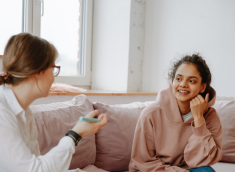Young people’s mental health is one of the most pressing issues facing us today. Even before the pandemic, young people’s emotional and mental health needs were on the rise, with support failing to keep up with need. Now, eight months of coronavirus restrictions have seen mounting of pressures on the young, just as NHS services are forced to grapple with entirely new challenges to their ability to provide care. Now more than ever, young people need mental health services designed just for them, that they can access easily and quickly in their local area.
Fortunately, the many decades of experience and expertise among Youth Access’ membership means that open-access, early support for young people is not a new approach. As a network, we have long known that support for young people can’t be broken up into individual issues, with young people passed from service to service and little communication in between. We know that long waiting times, arbitrary thresholds for support and an over-reliance on high-level, emergency care serve no-one – not young people, not the services designed to support them, nor wider society.
We know that, instead, the way forward is to make sure that support is accessible to all young people, listens to them and takes into account all of their needs under one roof. We know that lots of young people who have emerging needs, and who don’t necessarily require specialist mental health care, would benefit from support of some kind – support that is lacking significantly under the current system. This is what young people have for years been calling for and what our members have proved works time and time again. It’s also what human rights say young people are entitled to.
The Youth Information, Advice and Counselling Services – also known as YIACS – in Youth Access’ network do just that, providing quality early support for young people, for a wide range of issues – whether that be housing, employment, mental health or welfare, on the high streets and in the town centres where young people can easily access them. Importantly, YIACS provide support typically up to the age of 25, ensuring that young people don’t fall through the gaps as they approach 18.
In focus: The Youth Access YIACS model
The evidence behind YIACS-type services is compelling: research shows that the youth counselling provided through Youth Access services show similar clinical outcomes to those reported in CAMHS or school-based support, all while achieving much higher levels of satisfaction among young people. The same report also shows that voluntary sector organisations are supporting much higher proportions of ‘older’ young people, young people from LGBTQ+ and BME communities, as well as those who have experience of the youth justice system. This demonstrates the key role that Youth Access members and wider voluntary and community organisations play in providing support for young people who face multiple barriers and whose needs ‘traditional’ mental health support has historically failed to meet.
Such successes aren’t limited to mental health support, however. The links between poor mental health and wider issues affecting young people are clear, and mean that support can’t be limited to counselling or CBT. It’s no surprise, therefore, that advice services provided by Youth Access members – on housing, debt and employment issues, for example – are also shown to improve young people’s stress levels and/or general wellbeing. This is what young activists on Youth Access’ Our Minds Our Future campaign call a ‘Whole Life Approach’ to mental health, which has young people’s participation and holistic needs at its heart. It’s also been showcased throughout the coronavirus pandemic, with Youth Access members adapting their support to meet new restrictions and challenges with impressive innovation and speed.
Such an approach is cost effective, too: for young people who’ve reported improvements in their stress or health thanks to advice support, GP savings have been estimated to reach £108 per young person. And that’s just in General Practice: investment in early support for young people spanning mental health, information and advice has the potential to significantly reduce pressure and costs across government departments and statutory provision.
It’s no surprise, then, that YIACS-type services have long been hailed as a key pillar of young people’s mental health support in the community. Yet these open-access services have often not received the recognition and government backing warranted by this success. With a lack of dedicated, sustainable local funding, many Youth Access members are forced to “patchwork” funding together to keep vital services running, while a lack of representation of young people and voluntary sector organisations in local decision-making prevents the kind of transformational local change that could see this model become the norm for mental health provision across the country.
That’s why Youth Access has joined with the The Children’s Society and YoungMinds to organise an online cross-party panel discussion on how to improve the availability of early, community-based services for children and young people with emerging mental health needs. We will be using this platform to raise awareness about the successes of community-based support for young people to an audience of parliamentarians from across the political spectrum, officials, and senior colleagues from charities.
Our request to policymakers is clear: don’t start from scratch. Instead, look to the organisations already doing this great work, listen to what they and young people need, and invest to ensure the sustainability and expansion of support that takes the whole young person into account.
We hope that bringing together government, cross party members of parliament, officials, charities, service providers and young people today, will kick start a more joined-up, collaborative approach to mental health and take us one step closer to achieving a system that truly meets young people’s needs and rights, both now and in the long term.
What can I do?
- Get in touch. If you want to discuss how we can work together to ensure young people get the early support they need, email us at [email protected]
- Join us! Youth Access is a powerful network of services providing information, advice and counselling to young people. Find out more and become a member here
- Read our joint briefing with YoungMinds and the Children's Society on open-access mental health support for young people. Download it here [pdf].
- Share this blog on Twitter.


